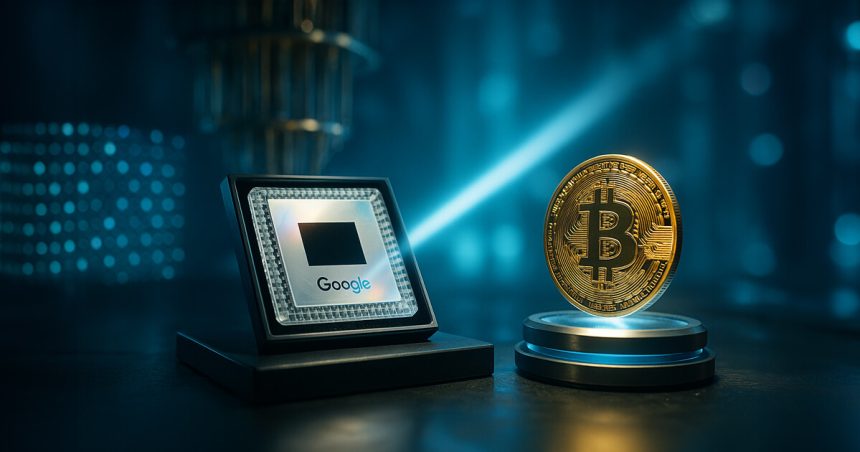
For many years, physicists have promised that quantum computing would sooner or later surpass classical machines. That day might have come.
On October 22, Google’s Willow quantum processor accomplished a job that may take a supercomputer 150 years to finish, compressing centuries of calculations into two hours.
Trade consultants say the outcomes, verified by Nature, aren’t only a victory for science. This can be a tremor that shakes the foundations of digital safety and raises new questions within the monetary world: How shut are we to a future the place quantum forces can break Bitcoin’s encryption?
breakthrough
This breakthrough focuses on the Out-of-Time-Order Correlator (OTOC), or “quantum echo” algorithm.
By operating at 99.9% constancy on 105 bodily qubits, Willow turned the primary processor to realize verifiable quantum benefit, proving that quantum computer systems can remedy advanced bodily fashions sooner and extra precisely than conventional supercomputers.
Merely put, Willow did not simply do the maths. I acknowledged that. The output revealed molecular constructions and magnetic interactions that had been mathematically invisible to traditional programs. This processor outperformed conventional machines by an element of 13,000, finishing calculations in hours as an alternative of years.
This milestone follows years of incremental progress. In 2019, Google’s Sycamore chip demonstrated “quantum supremacy” for the primary time.
By 2024, Willow has corrected her quantum error in actual time. The 2025 outcomes will take an additional step ahead, offering the primary absolutely verifiable and independently confirmed outcomes that can take quantum computing from principle to proof.
Talking on this milestone, Google CEO Sundar Pichai mentioned:
“This breakthrough is a vital step in direction of the primary real-world purposes of quantum computing, and we look ahead to seeing the place it leads.”
Bitcoin considerations
Bitcoin’s structure is predicated on elliptic curves and hash-based cryptography, particularly the SHA-256 algorithm.
Its safety is dependent upon how lengthy it takes even the quickest laptop to reverse a non-public key from its corresponding public key.
This can be a feat that may take billions of years on classical machines. However a quantum laptop able to operating Scholl’s algorithm may theoretically crack these cryptographic primitives exponentially sooner.
The very fact is that Bitcoin stays secure for now. Google’s Willow makes use of simply 105 qubits, far fewer than the tens of millions of error-corrected logical qubits wanted to threaten real-world cryptography.
However that does not totally reassure analysts like Jameson Ropp, who estimates that about 25% of all Bitcoin (about 4.9 million BTC) resides in addresses whose public keys are already public.
These cash primarily belong to early customers and dormant wallets, and would be the first to face dangers ought to crypto-enabled quantum programs emerge.
Moreover, institutional considerations are starting to floor.
Earlier this yr, BlackRock, the world’s largest issuer of Bitcoin ETFs, warned of quantum dangers, warning that advances in computing may “undermine the cryptographic framework that underpins Bitcoin.”
The corporate mentioned such threats stay “theoretical at this stage,” however confused that disclosure is critical to tell traders about know-how that “may change the elemental safety assumptions[of BTC].”
Repulsion
Regardless of the headlines, most trade consultants warn towards panic.
Bitcoin professional Timothy Peterson additionally argued that Willow’s spectacular outcomes are removed from an actual menace.
In line with him:
“Even beneath very optimistic and incorrectly extrapolated assumptions ({that a} quantum gadget can run SHA-256 at that pace and maintain it), it takes on common about 10 hours to search out one block, and all the Bitcoin international community produces one block each 10 minutes.”
Bitcoin entrepreneur Ben Sigman agrees with this view, declaring that:
“[Google]nonetheless wants tens of millions of secure, error-correcting qubits for quantum computer systems to achieve a ‘sensible’ scale that would doubtlessly threaten cryptography and Bitcoin.”
In actual fact, Anis Chohan, CTO of Inflectiv.ai, says: crypto slate “It will likely be not less than 10 years, perhaps two years, earlier than it turns into an actual concern.”
Nonetheless, not everyone seems to be relieved. Capriol founder Charles Edwards has warned that ignoring quantum dangers may result in “the most important bear market in historical past” by subsequent yr.
In the meantime, Jeff Park, CIO of ProCap BTC, took a extra philosophical view by viewing quantum computing as Bitcoin’s “local weather change.” he mentioned:
“Quantum computing is principally the local weather change of Bitcoin. There are plenty of idiots who deny quantum computing as a result of there is no manner they’ll perceive something amorphous or astronomical, and plenty of scientists who perceive quantum computing however cannot provide socially convincing options.”
What’s subsequent?
Past hypothesis, builders are already researching post-quantum cryptography, together with new programs based mostly on lattice issues, multivariate equations, and hash-based signatures that may resist quantum assaults. The Nationwide Institute of Requirements and Know-how (NIST) has shortlisted a number of such algorithms for standardization.
On the similar time, Bitcoin Core contributors introduced a proposal for a gradual transition to a quantum-resistant tackle format.
Nevertheless, implementing them requires broad consensus throughout miners, exchanges, and pockets suppliers, a feat of governance nearly as advanced because the know-how itself.
Nonetheless, Chohan concluded:
“We have seen related fears earlier than. Individuals as soon as thought RSA encryption was unbreakable, however then they feared it might be damaged in a single day.
Every time, we’ve got tailored. Quantum computing presents actual challenges, however we’re already engaged on post-quantum cryptography.
Governments, banks, and crypto networks all depend on related encryption requirements, so everybody has a standard curiosity in defending them.
It is not a query of having the ability to remedy this downside, it is a matter of managing the transition responsibly and easily. ”


